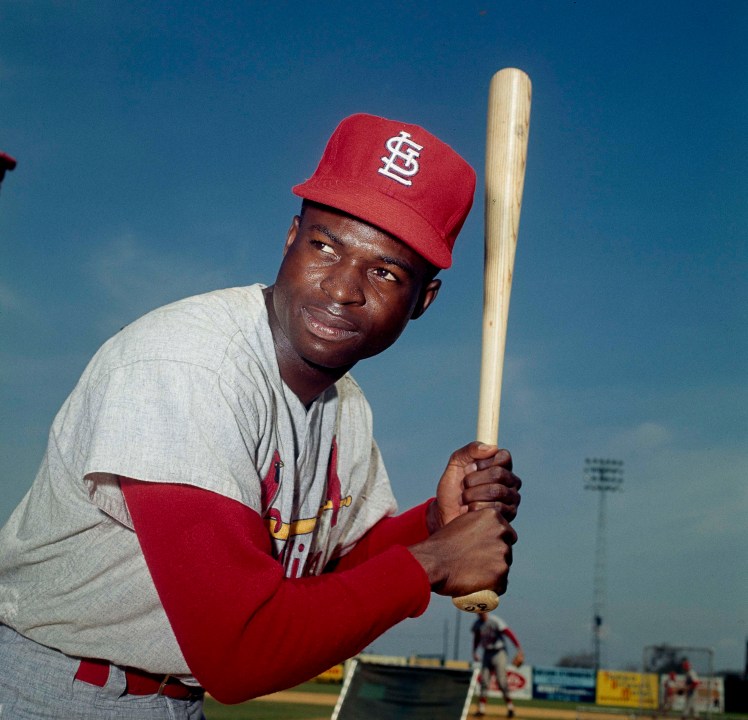Hall of Fame outfielder Lou Brock dies at age 81

ST. LOUIS, MO – APRIL 11: St. Louis Cardinals hall of famer Lou Brock throws out a first pitch before the Cardinals home opener against the Milwaukee Brewers at Busch Stadium on April 11, 2016 in St. Louis, Missouri. (Photo by Jeff Curry/Getty Images)
NEW YORK (AP) — Hall of Famer Lou Brock, one of baseball’s signature leadoff hitters and base stealers who helped the St. Louis Cardinals win three pennants and two World Series titles in the 1960s, has died. He was 81.
Dick Zitzmann, Brock’s longtime agent and friend, confirmed Brock’s death on Sunday, but he said he couldn’t provide any details. The Cardinals and Cubs also observed a moment of silence in the outfielder’s memory before their game at Wrigley Field.
Brock lost a leg from diabetes in recent years and was diagnosed with cancer in 2017.
“Over my 25-plus years of being his agent, he was perhaps the happiest Hall of Famer I’ve ever encountered,” Zitzmann said.
“I think he led a life that will never be duplicated,” he said.
The man later nicknamed the Running Redbird and the Base Burglar arrived in St. Louis in June 1964, swapped from the Cubs for pitcher Ernie Broglio in what became one of baseball’s most lopsided trades.
Brock stole 938 bases in his career, including 118 in 1974 — both of those were big league records until they were broken by Rickey Henderson.
Brock’s death came after Hall of Fame pitcher Tom Seaver died Monday. Brock and Seaver faced each other 157 times, the most prolific matchup for both of them in their careers.
Along with starter Bob Gibson and center fielder Curt Flood, Brock was an anchor for St. Louis as its combination of speed, defense and pitching made it a top team in the ’60s and a symbol of the National League’s more aggressive style at the time in comparison to the American League.
The Cards were World Series champions in 1964 and 1967 and lost to the Detroit Tigers in seven games in 1968. Opposing teams were warned to keep Brock off base, especially in the low-scoring years of 1967-68 when a single run often could win a game. But the speedy left fielder with the popup slide was a consistent base-stealing champion and run producer.
A lifetime .293 hitter, he led the league in steals eight times, scored 100 or more runs seven times and amassed 3,023 hits.
Brock was even better in postseason play, batting .391 with four homers, 16 RBIs and 14 steals in 21 World Series games. He had a record-tying 13 hits in the 1968 World Series, and in Game 4 homered, tripled and doubled as the Cardinals trounced Detroit and 31-game winner Denny McLain 10-1.

Brock never played in another World Series after 1968, but remained a star for much of the last 11 years of his career.
He was so synonymous with base stealing that in 1978 he became the first major leaguer to have an award named for him while still active — the Lou Brock Award, for the National League’s leader in steals. For Brock, base stealing was an art form and a kind of warfare. He was among the first players to study films of opposing pitchers and, once on base, relied on skill and psychology.
In his 1976 memoir “Lou Brock: Stealing is My Game,” he explained his success. Take a “modest lead” and “stand perfectly still.” The pitcher was obligated to move, if only “to deliver the pitch.” “Furthermore, he has two things on his mind: the batter and me,” Brock wrote. “I have only one thing in mind — to steal off him. The very business of disconcerting him is marvelously complex.”
Brock closed out his career in 1979 by batting .304, making his sixth All-Star Game appearance and winning the Comeback Player of the Year award. The team retired his uniform number, 20, and he was inducted into the Hall of Fame in 1985 in his first year of eligibility.
The soft-spoken Brock was determined no matter the score and sometimes angered opponents and teammates by stealing even when the Cards were far ahead. He also made two damaging mistakes that helped cost St. Louis the ’68 World Series.
In Game 5, with the Cards up 3-2 in the top of the fifth and leading the series 3-1, Brock doubled with one out and seemed certain to score when Julian Javier lined a single to left. But Brock never attempted to slide and left fielder Willie Horton’s strong throw arrived in time for catcher Bill Freehan to tag him out.
The Tigers were among many who cited that moment as a turning point. They rallied to win 5-3 in Game 5 and take the final two in St. Louis. In Game 7, won by Detroit 4-1, Brock made another critical lapse: He was picked off first by the Tigers’ Mickey Lolich after singling to lead off the sixth inning, when there was no score.
After his playing career was over, Brock worked as a florist and a commentator for ABC’s “Monday Night Baseball” and was a regular for the Cards at spring training. He served as a part-time instructor while remaining an autograph favorite for fans, some of them wearing Brock-a-brellas, a hat with an umbrella top that he designed.









